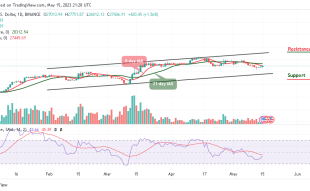Join Our Telegram channel to stay up to date on breaking news coverage
Signature Bank, a prominent financial institution, recently faced criticism from the Chair of the Federal Deposit Insurance Corporation (FDIC) for its apparent failure to comprehend crypto risks. The FDIC Chair’s remarks shed light on traditional banks’ challenges in the rapidly evolving digital assets landscape. This article explores the implications of the FDIC Chair’s comments and the broader significance for the banking sector.
The FDIC Chair’s Concerns
During a recent interview, the FDIC Chair expressed disappointment in Signature Bank’s lack of understanding regarding crypto risks. The FDIC Chair emphasized that embracing cryptocurrencies without fully grasping their complexities and potential risks could have severe consequences for banks and their customers.
Specifically, the FDIC Chair highlighted the potential for customers to be exposed to fraud and money laundering. In addition, the Chair highlighted the difficulty in tracking the source of funds in a theft. Additionally, the FDIC Chair was concerned that banks may not have the necessary systems to detect and report suspicious activity.
Cryptocurrencies like Bitcoin and Ethereum have gained significant traction in recent years. They have become a popular investment choice, a means of transaction, and a store of value for many individuals and institutions. The unique characteristics of cryptocurrencies, including decentralization and blockchain technology, have disrupted traditional financial systems and raised questions about their regulatory framework.
As a renowned financial institution, Signature Bank’s failure to comprehend the risks associated with cryptocurrencies raises concerns about the banking industry’s ability to adapt to the digital revolution. The FDIC Chair’s remarks indicate that Signature Bank’s crypto approach lacked adequate risk assessment and regulatory compliance measures.
Cryptocurrencies pose multifaceted risks. Volatility, regulatory uncertainty, cybersecurity threats, and the potential for money laundering and illicit activities pose challenges for financial institutions. Banks like Signature Bank may expose themselves and their customers to significant vulnerabilities by not fully understanding these risks.
The Importance of Risk Assessment and Compliance
The FDIC Chair’s comments underscore banks’ need to adopt comprehensive risk assessment frameworks and robust compliance mechanisms when engaging with cryptocurrencies. Proper due diligence is crucial to identify and mitigate potential risks, ensuring customer funds’ safety and the banking system’s stability.
Financial institutions must also establish clear guidelines and protocols for interacting with digital assets. These guidelines should encompass customer onboarding, transaction monitoring, fraud detection, and data security. By aligning their practices with evolving regulatory standards, banks can maintain the trust of regulators, customers, and the wider financial ecosystem.
To effectively navigate the crypto landscape, traditional banks must foster a culture of continuous learning and innovation. Establishing dedicated teams or partnerships with fintech firms and blockchain experts can enhance banks’ understanding of cryptocurrencies. This will facilitate the development of secure and compliant frameworks.
Moreover, collaboration between regulatory bodies, banks, and industry participants is paramount. Policymakers must work alongside financial institutions to establish a robust regulatory framework that promotes innovation while safeguarding against risks. Regions can ensure a more secure and inclusive financial system by fostering an environment that encourages responsible adoption and supports best practices.
Signature Bank’s failure to comprehend the risks associated with cryptocurrencies, as highlighted by the FDIC Chair, serves as a cautionary tale for the banking industry. As digital assets continue to gain prominence, financial institutions must equip themselves with the necessary knowledge, risk assessment tools, and compliance mechanisms to navigate this evolving landscape effectively. By doing so, banks can harness the potential benefits of cryptocurrencies while safeguarding their customers and the financial system’s stability.
Join Our Telegram channel to stay up to date on breaking news coverage


